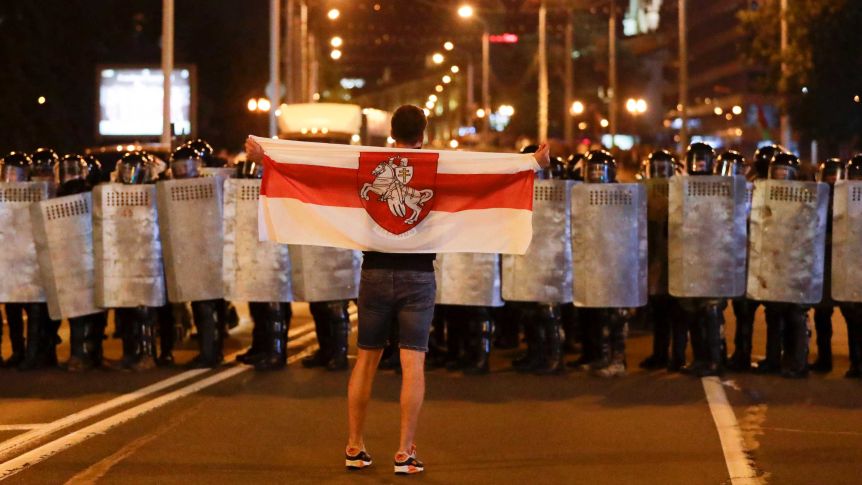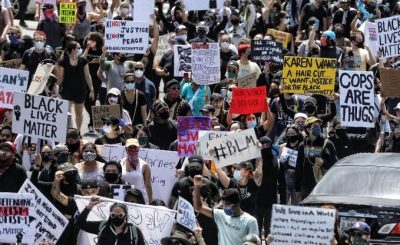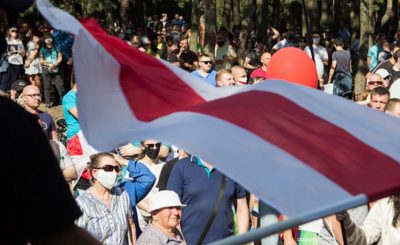1. Can you tell us a little bit about yourself (as much as you are able to safely) in terms of your ideology and activism?
I’m Busel from Belarus; I’m a communist, a Marxist-Leninist. I am not a member of any left-wing party or organization, but I do get in touch with some activists from communist organizations and with individual communists.
2. Belarus became a trending topic only a week ago after the elections. Can you give us a bit of background about the situation: Why are people angry? What do people want? What are the current political options?
Belarus is a small capitalist county with strong state power and a great deal of dependence on foreign markets for raw materials and exports. As everywhere in the capitalist world, we have a class of capitalists whose interests are represented by the state. This national bourgeoisie is closely associated with Lukashenko and his entourage. This national bourgeois group and the state machinery serving it get surplus value directly from state and private factories, plants, and agricultural enterprises.
Working people are exploited by capitalists and the bourgeois state. Consequently, they get low wages, their political and socio-economic rights have been restricted year after year; working people have become poorer and more disenfranchised, and a group of rich people have become richer and more omnipotent. It’s probably accurate to say that political rights have been restricted more than socio-economic rights. Thus social payments are made regularly and it’s not a problem to find a job, but frequently it will be a low-paying one. There are practically no delays in wages and so on. At the same time, freedom of speech, assembly, and association are prohibited. We have laws that regulate every step if you want to create an organization, a new media outlet or host a major event, so in reality you aren’t really able to do anything as you intended. Moreover, people are oppressed for criticizing the authorities, for attempts to see justice done.
Due to the political illiteracy of the population and liberal propaganda that has lasted for decades, people associate the deterioration of life, lawlessness, and injustice with one personality – President Lukashenko.
Several months ago, ahead of the elections, liberal forces abroad started a powerful campaign against Lukashenko in support of liberal candidates. (By the way, the main organizational and propaganda “headquarters” of liberal forces are the Telegram channels Nexta and Nexta Live, also located abroad, in Poland.) After the registration of presidential candidates, liberal forces gathered around one candidate, Sviatlana Tikhanovskaya, and managed to persuade many people to vote for her. Tikhanovskaya has become a symbol of “change”, which many people want.
So in this situation the last straw was electoral fraud and the subsequent violent actions of riot police against protesters. However, it’s important to understand this violence was initially instigated by aggressive, hired protesters, who were the first to attack the police and loot government buildings. This was followed by mass indignation on the part of the people and demands for the resignation of Lukashenko and an immediate end to the violence. These demands are fully supported, promoted, and instilled in the population by liberals.
We are now observing a typical “color revolution” prepared for and executed by liberals in the interests of Euro-Atlantic imperialism. So there are two political options now: either imperialism will carry out a successful coup or the Belorussian state with Russian support will prevail by pushing back. Neither option is in the interest of the working people of Belarus. In the first scenario, Belarus will become a neo-colony of Euro-Atlantic imperialism with all the attendant problems for the Belarusian people. In the second scenario, Russia, as payment for its assistance, will probably pursue a more aggressive policy towards Belarus, in which Belarus is absorbed as a region of Russia, with only formal respect for Belarusian sovereignty. This is not in the interest of the Belorussian people either.
3. What about the left in Belarus? How strong and influential it is? What is the left’s relationship with Lukashenko in Belarus?
We have several formal leftist parties and political organizations, which are in reality shards of the Communist Party of Soviet Union. Most of them fully support Lukashenko and the capitalist system in Belarus. They are weak and aren’t popular among the people.
Due to the treacherous position of these left-wing parties and organizations — one of them even calls itself “communist” — the people don’t have trust in communists at all, and it seems for some that Lukashenko is a “socialist” and Belarus a Soviet country.
A few years ago, a couple of Marxists clubs were formed in Belarus. There are not a lot of them, and their main objective has been studying Marxist-Leninist literature and uniting like-minded people. They don’t support Lukashenko, but don’t treat him as the Devil incarnate either, as the liberal opposition does. For these Marxist clubs, Lukashenko is just representative of the ruling class of the bourgeoisie.
So our true communist movement is very young and small and lacks sufficient communication between working groups. Moreover, it is not yet unified into a single communist organization. Marxist clubs do get in touch with each other but have disagreements.
4. The left outside of Belarus is just learning about what is going on inside the country, but even though they have no clue about it, are already offering their own solutions, as if Marxists in Belarus are just waiting for their approval to start doing something. What have been the activities of leftists in Belarus so far?
As I said already, one activity of leftist groups (and here I mean only Marxist clubs) has been learning Marxism-Leninism. Leftists groups have also written economic and political analyses, articles, and have made connections with foreign comrades, mostly from Russia.
And, as you’ve probably understood, the activity of the “official” left-wing parties and political organizations is to support the current bourgeois government and Lukashenko.
5. It is clear that the opposition only aims at integrating Belarus into the neoliberal, imperialist world economy. Is Lukashenko any better? Do his policies favor the workers of Belarus or the bourgeois class? Does he also carry out policies of privatization and austerity?
I would say that if we have to choose between two evils, than Lukasheno is the better choice. But Marxists don’t see just these two choices. We understand that on both sides there are bourgeois groupings, which express only the interests of the capitalist class and not the working class. These separate bourgeois groupings are currently fighting over the territory of Belarus for its properties, sales markets and political power.
Lukashenko’s policies principally favor the Belarusian bourgeois class. Every year the authorities compile a list of state-owned enterprises for sale. Lukashenko, as he himself has repeatedly said, is ready to sell any state enterprise, the only question is for what price. Lukashenko wants to sell at a high price, and potential buyers often disagree.
At many industrial enterprises in Belarus, buildings and equipment are worn out, and the management saves on tools and protective equipment. The existing system of enterprise management, corruption, privileges for businessmen and officials close to Lukashenko – all of this results in a lack of production development, low product quality, and, as a consequence, low wages for workers. It also means the gradual destruction of enterprises.
The current government has been slowly scaling back the social-economic rights of working people achieved during the Soviet Union, step by step, over the past 26 years. That is why the standard of living of the Belarusian people is not as low as in many other former republics of the Soviet Union.
But anyway, we have a bourgeois country that exists within the system of global imperialism, and we will not escape the inevitable deterioration of people’s lives, the fall of their incomes, nor bourgeois democracy and the strengthening of reactionary politics.
6. In a recent speech, Lukashenko said there is no oligarchy in Belarus. Has he really managed to overcome neoliberal brutality in Belarus?
No, that’s not true. This is Lukashenka’s habitual game of playing “people’s president”, a defender of ordinary workers and peasants and a fighter against capitalists. We have big capitalists who are connected with the authorities [in Belarus]. But in our country, unlike, for example, Russia, it is not yet customary to display wealth. Oligarchs in Belarus are in the shadows; most Belarusians know the names of only a couple of oligarchs. In addition, some of the big capitalists do not live here, but they do own large properties in Belarus.
7. There is a left-wing collective that is uniting under the current circumstances to provide a working class response to the situation. What do you think about it? Do you think it is strong enough to take control of the protests from the liberals? Do you think that the working class will be able to stmyie the neoliberal counter-revolution?
This attempt to unite leftist forces into one collective is indeed an excellent step forward in our communist movement. I know that some leftists who are currently working in this collective were originally skeptical about the possibility of a “color revolution” in our country, and for the most part just watched from the sidelines of the election campaign. But the massive outcry of people and, more signficantly, the participation of workers at the factories forced us to join the work. Thanks to personal connections between members of Marxist circles, it was possible to quickly establish communication and create a structure in which people from all over the world are already joining in to help us.
But despite the fact that several Belarusian Marxists were able to quickly begin cooperating with each other in this crisis situation, and despite this international support and assistance, we should not harbor any illusions: The collective has existed for only a few days, and, by and large, we have not yet established cooperation with all Belarusian Marxists who are ready to work. Moreover, we have not yet established ties with workers; we have no influence over them.
Perhaps the most important thing is that we were not prepared for the current situation, and therefore we are bound to make mistakes.
The current mass demonstrations of Belarusians, including strikes, have long been prepared by the liberal opposition and its Western patrons. This is part of the operation to carry out a liberal coup d’etat. We are dealing with a very experienced, well-organized and well-to-do enemy. Recently, unverified information has emerged that behind the organizational and propaganda “headquarters” of the liberals, called Nexta and Nexta Live, is the Central Group of Psychological Actions (Centralna Grupa Dzialań Psychologicznych), which is part of the Polish army.
So this is not just local performances being played out by the people, it’s a war. And we must evaluate our strength and the strength of the enemy before getting involved in a fight. I would like to be optimistic, but I have to be realistic. Our forces are small and still poorly organized. Therefore, for the moment we have no real capacity to take over leadership of the protest from the liberals. But the Marxists have a real opportunity to unite in this situation, to establish contacts with working collectives, as well as with comrades from abroad who are now actively helping us.
The same applies to workers. The working class in our country is disunited, it has neither its own party, nor its own trade unions (only state conciliatory ones), and has almost never in the history of “independent” Belarus (and here I mean in the period after the destruction of the USSR) has it advocated for its rights.
In addition, according to the information that we have, only those few workers who believe the liberal propaganda about a better life after Lukashenko are actively speaking out now, and therefore their main demand is his resignation. This coincides with the plans of imperialists to colonize our country.
Therefore, I don’t think the workers will be able to curtail the neoliberal counter-revolution. This can only be done by the current government under the leadership of Lukashenko and with the help of Russia. However, the workers will undoubtedly acquire and are already gaining invaluable experience in uniting and collectively fighting for their rights. This experience will not be in vain and should serve as the beginning of the labor movement in Belarus. And of course, the communists will not stand aside and will continue to actively work to unite the labor movement with scientific communism.
8. We understand that the working class is organized in collectives, however, it seems to be influenced by the opposition and to be leaderless. Is that correct?
Yes, you are right. We have many industrial enterprises, but the people there are mostly disunited. Workers are not used to uniting to defend their interests, and are not used to acting collectively. The liberal opposition has significant influence on the working people. This is due, first and foremost, to the constant lies spread by the authorities, along with longstanding injustice and lawlessness, that people no longer trust the authorities and their propaganda. Second, we do not have any strong and mass communist propaganda. And any belittling of communist ideology means strengthening bourgeois ideology. Therefore, the minds of many people in Belarus have been captured by liberal ideology.
For many years we had leaders in the nationalist opposition, but few people rallied around them. They tried to seize power after the 2010 presidential elections but this attempt failed. All of them were arrested before and during the recent election campaign. Then other leaders appeared: business people with liberal views, such as the banker Victor Babariko and entreprenuer Valery Tsepkalo. But they were not allowed to participate in the elections. Then the previously unknown wife of vlogger Sergei Tikhanovsky, Svetlana Tikhanovskaya, became the leader. When she was registered as a presidential candidate, the liberals ran a powerful PR campaign to support her. Of course she was not and is not the real leader of the protest movement; she is just the “name” and “face” of the movement.
I must say that many people in Belarus do not really care who will be in power as long as it is not Lukashenko. Therefore, if the liberals are able to carry out a coup, then Belarusians might accept any well-publicized leader.
9. In your opinion, what should the correct strategy and tactics of Belarusian Marxists be to preserve its benefits and to defend itself from neoliberal attacks?
I think that the Marxists should first of all expose the liberals and those Western European and American forces that stand behind them. It is necessary to prove to people at every step that they are attempting a coup d’état in the interests of Euro-Atlantic imperialism. They should explain the consequences of this coup for ordinary people and for the country as a whole. At the same time, we cannot take the position of unequivocal support for the current leadership of the country, since it acts primarily in the interests of the national bourgeoisie and not in the interests of the working people.
We do not have a revolutionary situation in our country, so the illusions of some leftists (I must say that there are not many of them) about the possibility of revolution must be immediately discarded. We also do not have strong communist and workers’ organizations that could, in the event of a coup d’etat, take power and carry out democratic reforms within the capitalist system. Therefore, when a coup d’etat is carried out, only reactionary forces will come to power, and no one else. This means that Marxists should not in any way unite with liberals and directly or indirectly support their strategy of action, including supporting their strikes. The current strikes at enterprises are carried out exclusively in the interests of liberals. The main demands of the protesters and strikers remain the resignation of Lukashenko. Some Marxists urge workers to defend their economic interests during strikes. But in the current situation, this means that, at best, the striking workers will add to the main political demand for the resignation of Lukashekno a number of economic demands, which in the event of a coup will have no meaning.
Therefore, in the current situation in Belarus, Marxists have every opportunity for political enlightenment of the masses, attracting like-minded people, and forging ties with working collectives. This will serve as the basis for further revolutionary activity of the Marxists, in whatever conditions we may have to work in the future.
10. From the perspective of the Belarusian people, what can international communists and anti-imperialists do to help?
First of all, they can reveal the truth about the processes taking place in Belarus. Western bourgeois media coverage of events, as usual, is distorted. A number of imperialist countries support protests in Belarus and continue to call Lukashenka a dictator, although we do not have a dictatorship of one person, but a dictatorship of capital. Comrades abroad can help expose Euro-Atlantic imperialism, which, in fact, is carrying out an attempted coup d’etat in our country. It is important for us not to allow the colonization of the country by imperialism, as has been done in many other countries before.
11. Do you think the Belarusian left, or even the international left, has learned anything from previous color revolutions in Yugoslavia, Ukraine and Georgia?
Undoubtedly there are many people from the left movement who clearly see that another “color revolution” is being attempted in Belarus. Many leftists have studied the history of color revolutions in other countries and now, as we say, they recognize the bird by flight. At the same time, we see that other leftists believe that a popular uprising is taking place in Belarus against the dictatorship of Lukashenko. On the surface, it might look like this. In addition, the liberals themselves present what is happening in Belarus as a spontaneous popular protest, which no one is leading. But it is worth looking a little deeper and it will immediately become obvious that there are organizers, financiers, and leaders of the protests. Most importantly, there are those who have clear interests in these protests. And these, of course, are not the Belarusian people. The main interest is in Euro-Atlantic imperialism, which is experiencing another deep crisis of the capitalist system.
12. Do you think the Turkish experience from the Gezi Uprising is a good example for the Belarusian left to learn from?
To be honest, we know very little about the uprising in Gezi and about the modern Turkish revolutionary movement in general. But undoubtedly, we must study the history of this movement and learn from the Turkish revolutionaries, who are now some of the most impressive anti-imperialist forces.
13. Do you have any message for Turkish revolutionaries and other progressive people?
The capitalist system has now united all the countries of the world into a single economic system, where everything is more or less dependent on each other. Capitalism has fully prepared the material basis for the communist structure of human society on Earth. And now global imperialism stands before its grave. Communists all over the world are the force that can organize workers to destroy it and begin building a communist international society. Therefore, I would like us to establish closer ties with Turkish revolutionaries, and with revolutionaries from other countries, and with all progressive people who realize that the capitalist system has exhausted itself.
We are right and we will win.
Source:




